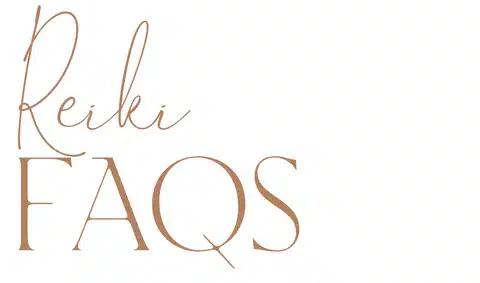FAQ about Reiki. Here are some of the frequently asked questions we get about Reiki.

- What is Reiki?
Reiki is a Japanese healing technique that involves the channeling of universal life force energy to promote relaxation, stress reduction, and healing on physical, emotional, and spiritual levels. - How does Reiki work?
Reiki works by the practitioner acting as a conduit for the flow of healing energy to the recipient. This energy helps to balance the body’s energy centers, remove energy blockages, and stimulate the body’s natural healing abilities. - What can Reiki help with?
Reiki can help with a wide range of issues, including stress, anxiety, pain management, emotional imbalances, insomnia, fatigue, and promoting overall well-being. It complements traditional medical treatments and can support the body’s natural healing processes. - What happens during a Reiki session?
During a Reiki session, clients typically lie fully clothed on a treatment table while the practitioner places their hands lightly on or just above the body in specific hand positions. The recipient may experience sensations such as warmth, tingling, or deep relaxation during the session. - Is Reiki safe?
Yes, Reiki is considered safe and non-invasive. It does not involve manipulation of the physical body or the use of any substances, making it suitable for people of all ages and health conditions. - How many Reiki sessions do I need?
The number of Reiki sessions needed varies depending on the individual and their specific goals or concerns. Some people benefit from a single session for relaxation and stress relief, while others may choose to have regular sessions for ongoing support and maintenance. - Can Reiki be done remotely?
Yes, Reiki can be performed remotely, also known as distance healing. The practitioner channels Reiki energy to the recipient, who may be located anywhere in the world. Distance Reiki can be just as effective as in-person sessions. - Do I need to believe in Reiki for it to work?
No, belief in Reiki is not necessary for it to be effective. Reiki works regardless of the recipient’s beliefs or skepticism. However, having an open mind and willingness to receive the energy can enhance the experience. - Can I learn Reiki myself?
Yes, Reiki can be learned through training and attunement by a Reiki Master practitioner. There are different levels of Reiki training (such as Reiki Level 1, Level 2, and Master/Teacher level), each offering progressively deeper understanding and proficiency in the practice. - Is Reiki covered by insurance?
Reiki is typically not covered by health insurance in most countries, as it is considered an alternative or complementary therapy. However, some flexible spending accounts (FSAs) or health savings accounts (HSAs) may allow reimbursement for Reiki sessions, so it’s worth checking with your provider. - Can Reiki be combined with other healing modalities?
Yes, Reiki can be combined with other healing modalities such as massage therapy, acupuncture, chiropractic care, and energy work. These modalities can complement each other, enhancing the overall effectiveness of the healing experience and addressing a wider range of physical, emotional, and energetic imbalances. - How should I prepare for a Reiki session?
To prepare for a Reiki session, it’s helpful to wear comfortable clothing and remove any jewelry or accessories that may interfere with the session. It’s also beneficial to arrive with an open mind and heart, allowing yourself to be receptive to the healing energy. You may also want to set an intention for the session or discuss any specific concerns or goals with the practitioner beforehand.
What are the 5 principles of Reiki?
The five reiki principles practiced in the world today were originally taught by Reiki Master, Dr. Mikao Usui. It was after 21 days of penance and fasting on Mount Kurama in Japan that Usui developed the spiritual practice of Reiki.
Usui developed these five principles as a way to assist our own spiritual and personal development. The foundation of Usui’s teachings was primarily the integration of these principles into one’s daily life.
Principle 1 – Just for today, I will not worry.
Principle 2 – Just for today, I will not be angry.
Principle 3 – Just for today, I will do my work honestly and with integrity.
Principle 4 – Just for today, I will be thankful for my many blessings.
Principle 5 – Just for today, I will be kind and compassionate to myself, my neighbor and every living thing.
